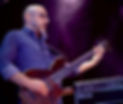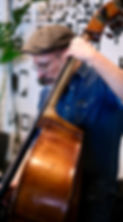
Born in Palermo (Sicily, Italy), from always a crossroads of cultures in the heart of the Mediterranean sea, Luca Lo Bianco is an eclectic bassists as well as a composer and bandleader with a personal sound and aesthetic.
He started his journey into music studying electric bass and classic double bass and he graduated with the maximum grade in double bass in 1999 at the State Music Conservatory 'V. Bellini' of Palermo. Later he obtained the Master degree in Jazz Music Magna Cum Laude with a thesis entitled 'Musical syncretism in contemporary Jazz’.
Luca’s strong rhythmic approach and the lyricism combined with a personal sound define his playing and writing. His constant search for sounds in which dance, unpredictability, risk and curiosity coexist is deeply linked with his musical and human experiences.
The music he plays speaks many languages and goes beyond genre boundaries. These concepts are well represented in some of the bands he founded or collaborated with such as Orchestra In-stabile DIS/accordo [O.I.D.], ranked second in the category Best Italian Orchestra in the 'JazzIT Award', the contemporary jazz quartet Luca Lo Bianco quartet, the modern jazz chamber trio Leipold - Bucher - Lo Bianco or the music of the label he founded, Fitzcarraldo Records.
In these years Luca has been established himself as an educator, teaching bass in various State Music Conservatory in Italy (Palermo, Messina, Pesaro, Mantova), as well as a performer playing in numerous festivals and clubs all over the world (Japan, China, Austria, Switzerland, Norway, Portugal, USA, Malaysia, Spain, Holland, France, Slovenia, Germany, Italy, Turkey).
He recorded more than 40 CDs playing in studio and live, with Bill Russo, Gunther Schuller, Mauro Pagani, Gregory Hutchinson, Paul Jeffrey, Adam Rudolph, Ferenc Nemeth, Jimmy Weinstein, Salvatore Bonafede, Fabrizio Bosso, Ettore Fioravanti, Dusko Gojkovich, Javier Girotto, Amy Denio, Alfio Antico, Stefano D’Anna, Riccardo Fassi, Michael Rosen and many more.
“Lo Bianco takes numerous risks with this project and for the most part they pay off. The quartet play with plenty of spirit, shifting between strong melodic formations and the loosely structured without ever over-playing their hand. An interesting and absorbing album".
Neil Duggan
All about Jazz
"la contrebasse ronronnante de Lo Bianco fait du bien aux oreilles”.
Yazid Kouloughl
Jazz Magazine France
“Bassist Luca Lo Bianco provides a steady rhythmic wave for guitarist to ride smoothly to shore, but on the reggae-influenced, highly syncopated “Cinque Bambole” and the free-jazz-on-acid spine-chiller “Blood On Black Lace,” he churns up a few contrapuntal rip currents, which Cappelli navigates with ease”.
Bobby Reed
Down Beat
"The music is modern and nervous. With the right urban air and the appropriate curiosity to drive the quintet to look around and investigate the hidden corners of the many scenarios in chiaroscuro which conceal patches of dark, threatening light. As if we were inside a Werner Herzog film. The core language is contemporary jazz but of course the most diverse idiomatic influences add a value which must be appreciated”
Maurizio Comandini
All about Jazz
“It refers to a contemporary jazz veined with rock and urban experimentation the new work of Sicilian double bassist Luca Lo Bianco. EAR CATCHER works on timbres that already the downtown scene of the 90s has accustomed us to appreciate, with guitar, cello and rhythm section capable of high expressive synthesis (6/7) ”.
Enrico Bettinello
Blow Up
"Lo Bianco uses autobiographical material here, good fuel to set up a series of surprises in the dynamics in between Crimson and Ornette Coleman without eliminating himself from chamber fascination".
Alceste Ayroldi
JazzIT
"The beauty of the overall work of Luca Lo Bianco is to mediate his important chromatic research with massive melodic doses, sought out for a deep impact".
Marco Biasi
Storia della Musica
